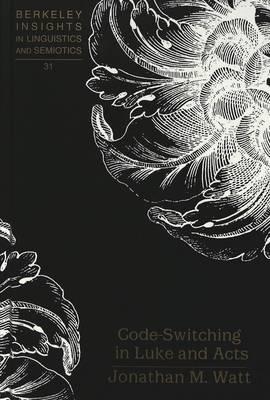Overview
Divergence of style characterizes the Greek dialect that appears in the New Testament books of Luke and Acts. Some parts contain standard Koine while others show varying degrees of Semitic influence. This sociolinguistic study concludes that the continuum of Semitized Greek appearing in the ancient texts functions like the metaphoric variety of code-switching performed by modern bilinguals. The variations can be explained, in part, by Luke's tendency to use Semitic linguistic features when describing Jewish subject matter while retaining standard Koine for Hellenistic interest.
Full Product Details
Author: Jonathan M. Watt
Publisher: Peter Lang Publishing Inc
Imprint: Peter Lang Publishing Inc
Volume: 31
Weight: 0.600kg
ISBN: 9780820436951
ISBN 10: 082043695
Pages: 307
Publication Date: 01 October 1997
Audience:
Professional and scholarly
,
Professional & Vocational
Format: Hardback
Publisher's Status: Active
Availability: Available To Order

We have confirmation that this item is in stock with the supplier. It will be ordered in for you and dispatched immediately.
Reviews
The subject of Semitic influence in the Greek New Testament continues to challenge biblical scholarship. Dr. Watt makes a distinctive contribution to the subject by providing a new perspective on it, and students of the New Testament language will want to pay serious attention to his proposals. (Moises Silva, Gordon-Conwell Seminary) Jonathan Watt's monograph on the sociolinguistic concept of code-switching is much to be welcomed. Not only does it advance our understanding of the issue of Semitisms in the New Testament, but it provides further evidence of the need for modern linguistic studies of the Biblical text. (Stanley E. Porter, Roehampton Institute London) Dr. Watt's study is an exciting application of the techniques and results of modern language contact research to the most famous ancient multilingual contact situation. His finding that the range of Semitic features in Luke and Acts is correlated with differences in writing style and register offers important new insights into the process of Biblical composition. (Sally Thomason, Professor of Linguistics, University of Pittsburgh) An enduring religious interest in the New Testament does not diminish the fact that it is also a historical document. In this exciting new book, Jonathan Watt indicates a new direction in Biblical research by combining historical research with present day sociolinguistic insights to show us a new dimension in understanding the New Testament. (Christina Bratt Paulston, Professor of Linguistics, University of Pittsburgh)
Author Information
The Author: Jonathan M. Watt, M.Div., M.A., Ph.D., is pastor of the College Hill Reformed Presbyterian Church in Beaver Falls, Pennsylvania. He also serves as a part-time faculty member at Geneva College and at the Reformed Presbyterian Theological Seminary (Pittsburgh).




